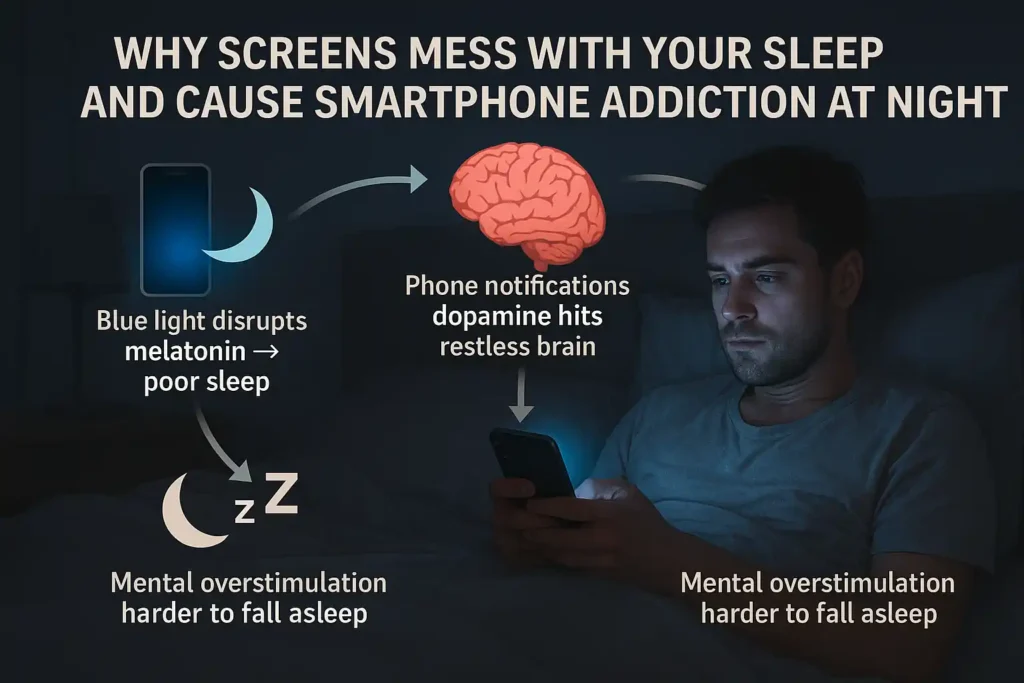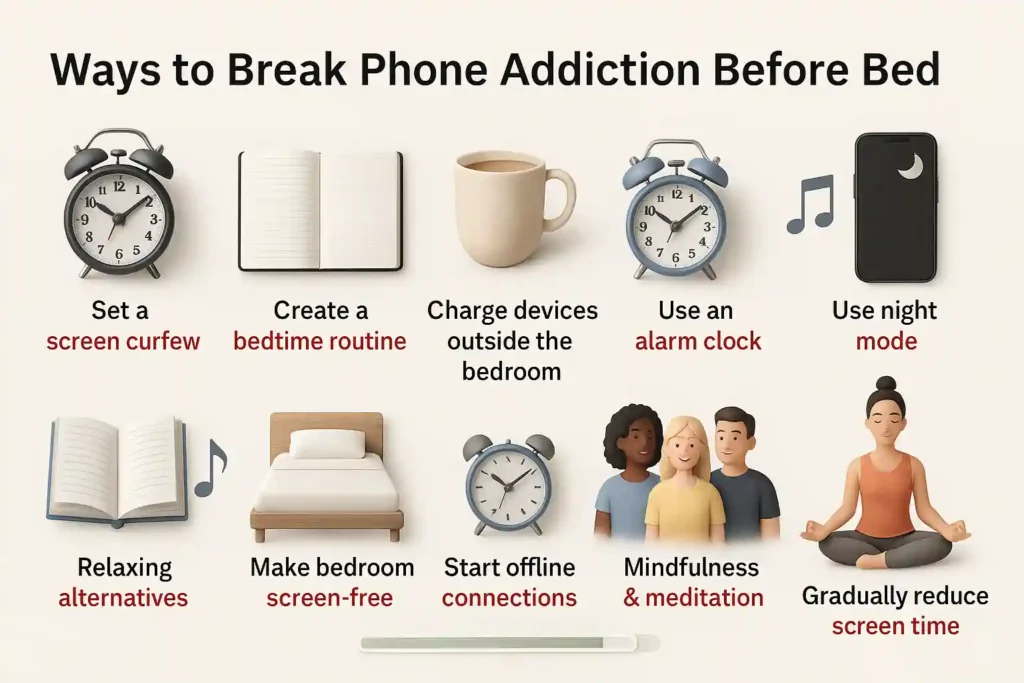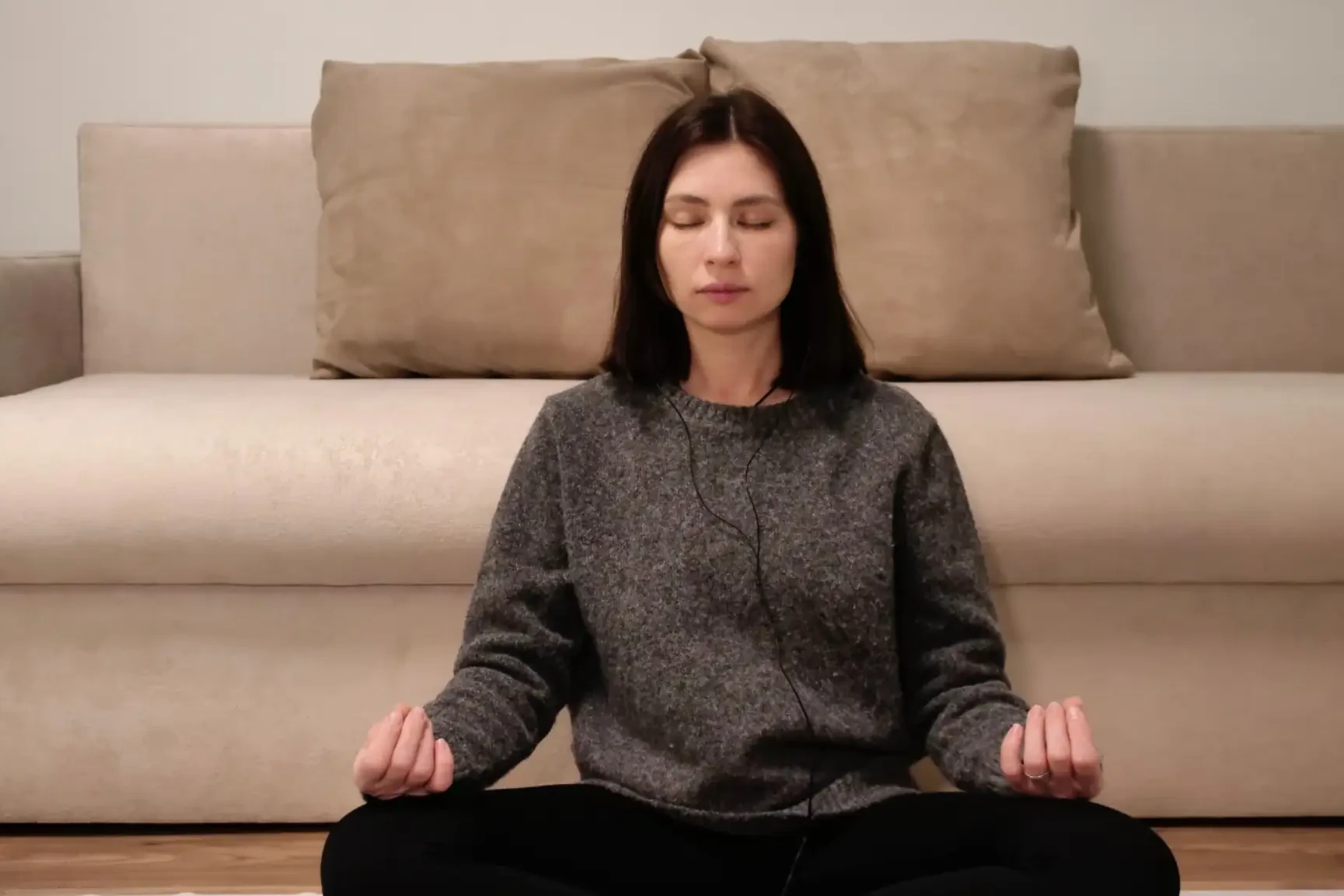Struggling with smartphone addiction or feeling addicted to the phone before bed?
Smartphone addiction at night is no small issue. Many people lie in bed with their phones glowing inches from their face. The habit feels harmless, but it silently harms sleep, focus, and health.
Late-night scrolling tricks your brain into alertness when it should slow down. Social media feeds, endless short videos, and late emails trap your attention. The phone becomes the last thing you see before sleep and the first thing you grab in the morning. That is why more and more people say they are addicted to their phones before bed.
Breaking this cycle is not just about willpower. It is about understanding how screens affect the brain and creating routines that make it easier to rest. Let us explore what is really happening and ways to control phone addiction at night with practical strategies.
Table of Contents
ToggleWhy Screens Mess with Your Sleep and Cause Smartphone Addiction at Night
Smartphones are designed to hook attention. But at night, the cost is greater. Sleep is delicate, and phones disrupt both the mind and body in hidden ways.
The Trouble with Blue Light and Sleep Quality
Most people know screens are bright, but few realize how harmful that glow can be. The light from phones is heavy in short wavelengths, known as blue light. When your eyes see blue light at night, your brain thinks it is still daytime.
Melatonin, the hormone that prepares the body for rest, gets blocked. That means falling asleep takes longer. Even if you sleep, the quality is poor. You wake up tired despite lying in bed for hours. This is the hidden link between phones and blue light sleep disruption.
Imagine two friends, one reading a paperback book at 10 PM and the other scrolling Instagram under the covers. The book reader falls asleep within minutes. The phone user stays awake past midnight, staring at reels. The difference is not just discipline, it is biology.
The Buzzing Brain Problem from Smartphone Addiction
Phones do more than shine light. They feed the brain endless information. Each ping from a notification or swipe on TikTok causes small dopamine releases. Dopamine makes you feel rewarded and keeps you coming back.
At night, this stimulation leaves the brain restless. Instead of slowing down, your mind races. Even if you put your phone down, your brain continues processing. That is why people describe lying in bed with a buzzing head after using their phone. This restless mental state is a big part of smartphone addiction.
Ways to Break Phone Addiction Before Bed
Breaking bad habits feels hard, but simple steps can help. These methods are not one-size-fits-all. You can mix and match them to find what works best for you.
Set a Screen Curfew to Avoid Smartphone Addiction at Night
Choose a time when you put away all screens, maybe one hour before bed. Treat it like a rule. This digital detox before bed trains your body to expect calm instead of stimulation. Even 30 minutes can improve sleep.
Create a Bedtime Routine without Blue Light Disruption
Humans love routine. Replace scrolling with habits that prepare the body for rest. Take a warm shower, write three lines in a gratitude journal, or sip chamomile tea. Over time, these actions will replace bad bedtime phone habits.
Charge Devices Outside Your Bedroom to Stop Being Addicted to Phone Before Bed
If your phone is within reach, you will grab it. That is why charging outside your room works. It removes temptation. Keep a charging station in another room. This small step is powerful for people who feel addicted to phone before bed.
Get an Alarm Clock and Break Phone Addiction Habits
Many keep their phone near the bed because it doubles as an alarm. The solution is simple: buy a small alarm clock. By removing the excuse, you lower temptation and begin breaking phone addiction routines.
Use Night Mode to Reduce Blue Light Sleep Problems
For nights when phone use cannot be avoided, at least reduce the harm. Activate night mode, which warms the screen colors. While not perfect, this lessens blue light sleep disruption and protects melatonin release.
Try Relaxing Alternatives for Breaking Phone Addiction at Night
Fill the gap left by scrolling. Pick up a paperback novel, sketch in a notebook, or listen to slow music. These activities calm the brain and show you how to fall asleep without phone interference.
Make Your Bedroom a Screen-Free Zone to Beat Smartphone Addiction
Bedrooms should be linked to rest, not screens. Keep televisions, tablets, and laptops out. When your brain associates the bedroom with peace, it becomes easier to relax.
Start a Book Club with Friends Instead of Late-Night Screen Time
Phones satisfy the need for connection. Replace it with real connection. Form a small reading group with friends. This adds accountability and creates fun, offline interactions that are far healthier than late-night social scrolling.
Practice Mindfulness or Meditation to Break Smartphone Addiction
Mindfulness reduces restlessness. Breathing exercises or guided meditation help quiet the mind that is overstimulated by notifications. Ten minutes of meditation can do more for sleep than thirty minutes of scrolling. This is one of the best ways to control phone addiction.
Gradually Reduce Screen Time to Overcome Phone Addiction
Some people fail when they try to quit cold turkey. A better way is to reduce it slowly. Start by cutting 15 minutes of screen time each week. Over time, you regain control over phone addiction at night without overwhelming yourself.
The Benefits of Breaking Smartphone Addiction and Reducing Blue Light Sleep Disruption
When you succeed, the rewards are noticeable. You fall asleep faster. Sleep becomes deeper and more refreshing. The grogginess that made mornings hard fades. Mental clarity improves.
Breaking free from being addicted to the phone before bed also reduces anxiety. Social media pressures fade when they are not the last thing you see at night. Energy levels rise, and your day feels more focused.
A simple decision like charging your phone outside your room can add years of better sleep quality. That is the power of breaking phone addiction and limiting blue light sleep disruption.
The Bottom Line
Phones are useful, but their timing matters. Using them late at night robs you of rest. Between smartphone addiction design and blue light sleep problems, your brain stands no chance if you do not set boundaries.
The key is not to throw your phone away but to control it. A screen curfew, a calming routine, and mindful choices can restore balance. Once you reclaim your nights, mornings become brighter and energy lasts longer.
Sleep should be sacred. Protect it by breaking free from phone habits that keep you trapped at midnight.
FAQs
How do I stop being on my phone all night?
Set a screen curfew, charge the phone outside your bedroom, and replace scrolling with calming habits like reading or journaling that prepare your mind for rest.
How do I stop wanting to use my phone?
Limit notifications, practice mindfulness, and create a relaxing night routine. Replace the craving with enjoyable offline activities that keep your mind engaged without screens.
How do I break the habit of using my phone?
Start small. Reduce screen time by 15 minutes each night. Use an alarm clock and charge devices outside your room to reduce temptation and create new routines.
Is phone addiction reversible?
Yes. With steady practice and changes to the environment, most people can reverse phone addiction at night. The brain adjusts when healthy bedtime patterns are repeated consistently.
Can a phone addiction damage the brain?
Overuse can affect attention, memory, and mood. Late-night scrolling overstimulates the brain, leading to poor focus. The damage is not permanent if habits are improved early.
Can 3 days without your phone reset your brain?
A short break helps reduce cravings and mental restlessness. However, three days alone will not fix long-term habits. Real reset comes from consistent, repeated behavior changes.
How to become less attached to your phone?
Set app limits, avoid screens in your bedroom, and spend more time on offline hobbies. Build connections through in-person activities rather than digital scrolling late at night.
What is phone detox?
Phone detox is a planned period of reduced phone use, especially before bed. It allows your brain to rest, reset, and rebuild healthier bedtime patterns without constant digital stimulation.
About The Author

Medically reviewed by Dr. Chandril Chugh, MD, DM (Neurology)
Dr. Chandril Chugh is a U.S.-trained, board-certified neurologist with expertise in diagnosing and managing neurological disorders, including migraines, epilepsy, Parkinson’s disease, and movement disorders. His clinical focus includes evidence-based neurological care and patient education.
All content is reviewed for medical accuracy and aligned with current neurological guidelines.






